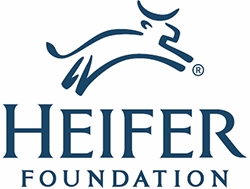What’s Inside
A Letter from Ardyth
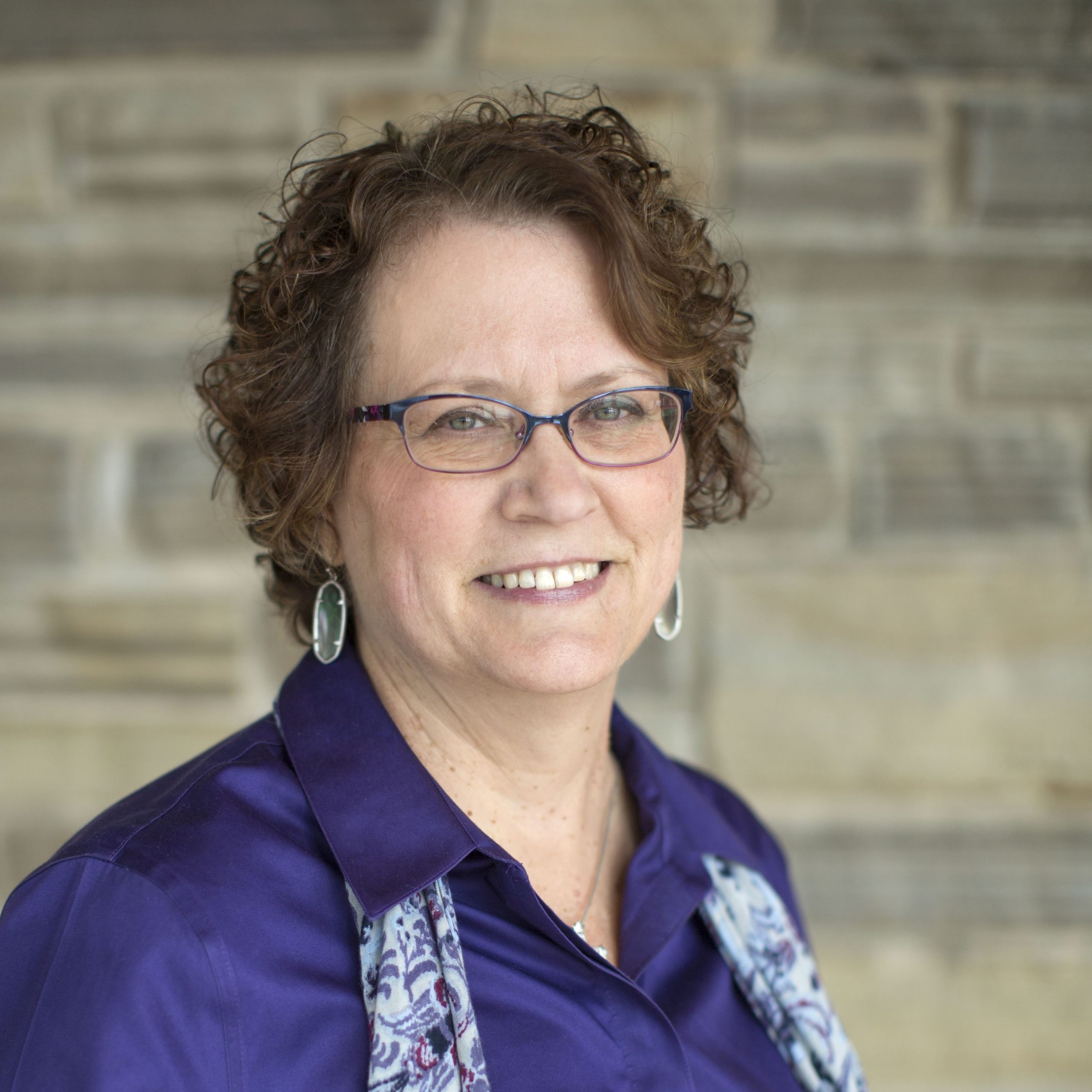 Dear Heifer Foundation Community,
Dear Heifer Foundation Community,
I hope you’ve entered this new year with gratitude and optimism for what the future holds. As for me, I am grateful to have so many inspiring people in my life, yourself included.
Last month, we celebrated International Women’s Day and Women’s History Month. I hope that you were able to take time to celebrate the incredible women in your life who have made you the extraordinary and generous person you are today.
But while society has made great strides toward gender equality, our work is not done.
We know that poverty is a vicious cycle — one that disproportionally discriminates against women. When families do not have enough money to send all their children to school, girls are often the first to be pulled from class. When families don’t have access to clean water, girls must walk miles to the nearest source and painstakingly carry it back. When families use wood-burning stoves to cook and heat their homes, girls must spend hours gathering firewood. And when girls reach a certain age, they marry and begin having children, and the cycle continues.
But we are determined to break this cycle, once and for all. We do this by giving women the animals, education and opportunity they need to achieve bright, successful futures — ensuring that their families never go hungry again.
We know that women have the power to change the world — and that they are key to ending hunger and poverty. With the support of donors like you, we’re helping them make it happen. Thank you for being part of this transformational change!
Yours For a Better World,
Ardyth Neill
Women Enacting Change
The Potential Impact of Regenerative Agriculture
on Food Systems
According to food systems expert Danielle Nierenberg, sustainable and regenerative agriculture can be scaled to feed the nearly 330 million people in the United States daily while also mitigating climate change. As the co-founder of Food Tank — an organization focused on building a global community for safe, healthy and nourished eaters — Nierenberg is a leading advocate for environmentally and economically sustainable food and farming systems.
Read More
Nierenberg joined Heifer International CEO Pierre Ferrari to discuss the challenges and opportunities for building more resilient food systems beyond COVID-19. Nierenberg pointed to Heifer’s model as an example of how environmentally and socially sound agricultural practices can improve farmers’ incomes while bolstering food systems. “If you look at Heifer’s model around the world, you’ve been able to create massive scale by replicating and [by] farmers teaching other farmers,” she said.
Nierenberg added that currently, most of the world’s population is fed by small-scale farmers, and she said traditional scaling methods in the agricultural industry during the pandemic in the U.S. led to supply chain disruptions and large outbreaks of COVID infections at processing plants. As an alternative, Nierenberg is a proponent of regenerative agriculture, a farming method that rehabilitates the land. It is particularly effective at carbon sequestration, which lessens atmospheric carbon, a big driver of climate change. “Agriculture is one of the biggest contributors to climate change, but it could also be one of the biggest solutions to climate change,” she said, referring to regenerative practices.
Now might just be the right time to push for change in food systems, Nierenberg says, with more interest than ever before in issues related to food access, affordability and equity because of the pandemic. “[There’s a] growing consciousness that things need to change,” she said. “We have a real moment.”
Justice, Food and the Power of Community
Karen Washington is on a mission to get fresh, healthy food into the hands of those who can’t afford it. A native New Yorker and physical-therapist-turned-farmer, Washington has been preaching the benefits of urban gardens to her fellow city dwellers for decades. Today, Washington is one of the owners of Rise and Root Farm, a working farm founded with the goal of building a strong local food community centered on equity and justice. “We’re trying to provide people with as much fresh food as possible,” Washington said. “One thing we [Rise and Root Farm] pride ourselves on is that everyone has a right to our food, no matter what. We never turn away anyone who is hungry.”
Read More
Washington joined Heifer USA Director Perry Jones to discuss the future of food and the power of community in creating a new food system. Though the pandemic has brought the issue of food security to a wider audience, it’s not a new issue for many New Yorkers in communities of color. “We’ve always had difficulty finding fresh, local produce,” Washington said. “We’re surrounded by fast food, junk food and processed food.”
Today, we have a unique opportunity to examine how we do things and how our food system operates. “We can’t go back,” Washington said. “This is a moment in time where racial and economic inequities are at the forefront. How do we move forward as a society to make sure that people understand that water and food are human rights for everyone?”
To create a just and equitable food system, the people who grow, harvest and process our food must be paid a living wage, must be treated humanely and must have access to health care. “At the end of the day, let’s make sure we talk about the human aspect of food,” Washington said.
The discussions with Danielle Nierenberg and Karen Washington were part of a speaker series, #HeiferTogether, which addresses the state of farmers around the world during the COVID-19 pandemic. In the live, virtual conversations, Pierre Ferrari and other Heifer International leaders talk to experts about the present and future of our global food and farming systems, small farming in the United States, tech in agriculture, farming as it relates to the environment, and more. Find the full conversations at Heifer.org/LiveChats..
Community Chicken Vaccinator Earns Income, Hatches Hope in India
A community vaccinator is an essential animal health care worker who provides low-cost chicken vaccines and deworming treatments to poultry farmers. With support and training from Heifer International, women in Odisha, India, are stepping forward to fill these roles for local farmers while earning an income of their own.
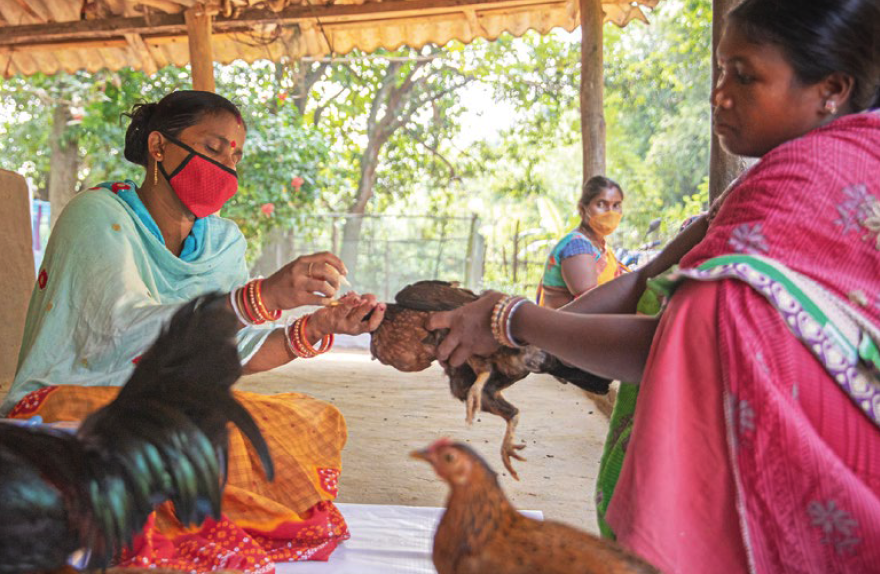
Read More
Jena is one of nearly 200 community vaccinators trained through Heifer India’s Hatching Hope project, which aims to improve the nutrition and income of 3.2 million people in the state of Odisha through the production, promotion and consumption of poultry. The ultimate goal of the project is to close the living income gap for project partners and their families.
A living income is the amount of money each person in a household needs per day to live a dignified life. In Odisha, the living income is $1.16 per person, but many families fall below this mark and are unable to afford necessities like nutritious food, clean water, housing, education and health care.
Community vaccinators help poultry farmers close this living income gap by providing affordable vaccinations and deworming treatments for flocks. When chickens are healthy and happy, they produce more eggs and fetch higher prices. In turn, farmers pay community vaccinators for their services and help them to earn a living income of their own.
Building a Sustainable Livelihood
Like many women in rural Odisha, Geeta Rani Jena didn’t have many employment opportunities outside of her home. Yet, when she heard that Heifer India was offering to train new community vaccinators, Jena jumped at the chance to take part. The job was a perfect fit — a fantastic opportunity for a mother of two with no time to spare.
“With my current schedule, I cover 60 to 70 households in two villages,” Jena said. “I can comfortably cover these families as I also look after other work in my house. Vaccination work can only be done either in the morning or in the evening.”
Jena has been working as a community vaccinator for almost two years. When she started making her rounds, business was tough. Local farmers had little to no knowledge of the diseases plaguing their flocks, never mind that most were easily preventable.
“When I started, I used to charge 2 rupees (around 55 cents) per bird for vaccination and deworming each,” Jena said. “I was earning only 700 to 800 rupees ($9 to $11) a month at that time.”
To help farmers understand the importance of vaccinating their birds, Heifer India hosted trainings and educational campaigns designed to spread the word to local poultry producers that chicken vaccines are good for business and available through community vaccinators. Jena took up the cause and soon noticed that demand for her services and expertise were increasing.
As the farmers who hired Jena noticed the improvement in their flocks, more clients sought her out. In just a matter of months, she was earning five times the income she earned before, enough to cover family expenses a month at a time with money left over to save.
“I have seen a major shift in awareness and attitude among my community members,” Jena said. “Now that they are also seeing the results, they are more willing to continue taking services and grow their flocks. While this helps them prevent mortality, it directly affects my income as well.”
Securing a Stable Future
Jena’s income as a community vaccinator has kept her family afloat during the ongoing COVID-19 pandemic and the stringent lockdown that ensued. Governmental restrictions prohibited residents from leaving their homes during lockdown, which meant that Jena as well as many of her friends and neighbors couldn’t work. With no income during the three-month period, Jena supported her family with the money she had saved.
“The three months were a great setback,” Jena said. “But, thanks to the savings I had kept from my work, I was able to sustain myself and my family. Now things have started again, and I am back to earning 2,000 to 2,200 rupees ($27 to 30) a month. I used up most of my savings during that time, so now from this income, I am again creating a fund of savings for such events.”
Thanks to her skills as a community vaccinator and the ever-increasing demand for her services, Jena is confident that she can provide for her family regardless of the challenges ahead.
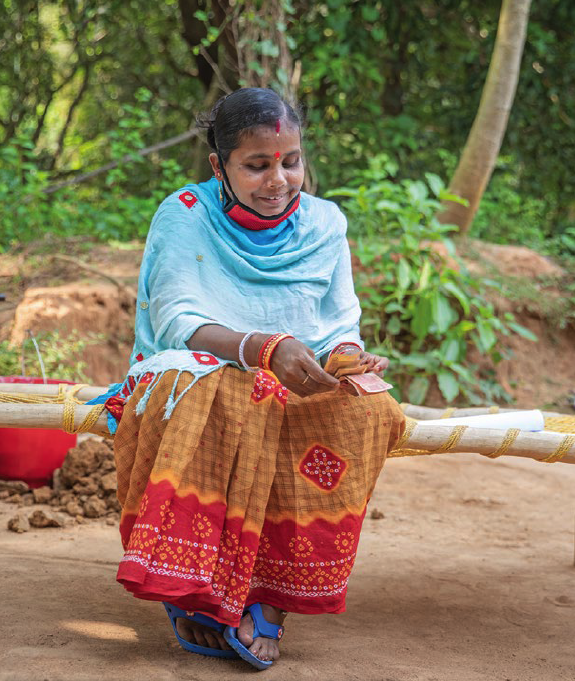
—Geeta Rani Jena
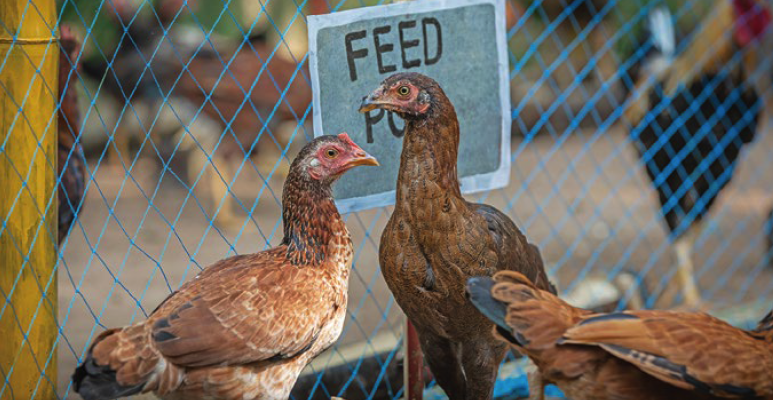
Empowered Women Power Economies
Although women are half the population, women and girls are more deeply affected by hunger and poverty. At Heifer, we recognize the crucial role women play in community improvement and see the endless leadership potential in women. We have seen the transformational change that occurs in families and communities when women have decision-making power and opportunities to earn income, and we are dedicated to removing barriers to women’s economic empowerment. When women lead, everyone learns, grows and wins.
But while women have limitless potential, they often have limited opportunity. In many struggling communities, girls do not receive formal education and women are not able to own property such as their homes, land or even livestock. Women often do not have a voice in their families or communities, and they are forced to do hard manual household work.
Our projects give women the resources, training and opportunity to break free from these gender stereotypes and find success. Many of these women become leaders in their communities and help improve the lives of others around them. As a result, farms become more productive, hunger is decreased and their families and neighbors benefit.
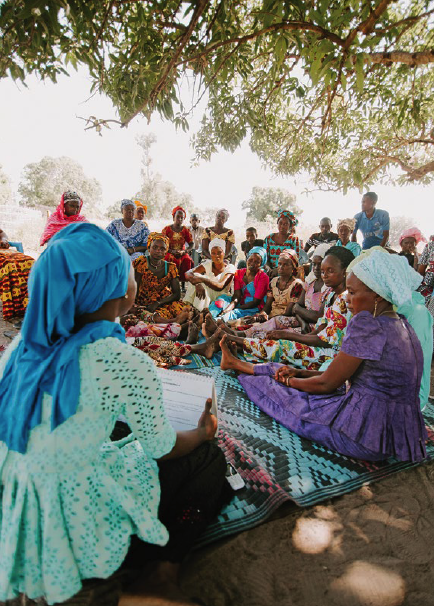
How Our Projects Empower Women
Gender equity is key to Heifer projects. We seek to increase women’s decision-making power in their own homes and in their communities, as well as their access to income, assets and leadership roles.
We do this by:
Working with Community Groups
Groups provide a safe space for women to discover their strengths, allowing them to add value to the decision-making process at home and in their communities. Group savings and loans provide access to cash for business activities or act as a safety net for emergency needs.
Designing Projects with Women in Mind
Projects consider livestock and other inputs appropriate for women’s unique needs. This consideration gives women social and economic benefits.
Promoting Gender Equity
Programs designed for gender equity allow women and men to share the work and the benefits, leading to poverty reduction.
Engaging Men with a Family Focus
Empowering women to end poverty requires engaging men along the way. Gender and Family Focus is one of our 12 Cornerstones for Just and Sustainable Development, which promotes the fair sharing of work, decision-making, resources and benefits among all family members.
BUILD A RESILIENT FUTURE
If we learned anything over the past year, it’s that you never know what the future holds. However, having a plan in place makes you resilient. Now is a great time to establish your plan and help create a better future. And when you set up a donation to Heifer as part of your estate, you create long-term impact that will support and strengthen communities for generations.
Create a better future by adding Heifer…
- to your will or estate plans
- as a beneficiary to your retirement
plan assets - in a charitable trust
- to a donor-advised fund
Request Your Free Guides!
For more information, contact Debbie McCullough at 501.907.4922 or debbie.mccullough@heiferfoundation.org.
